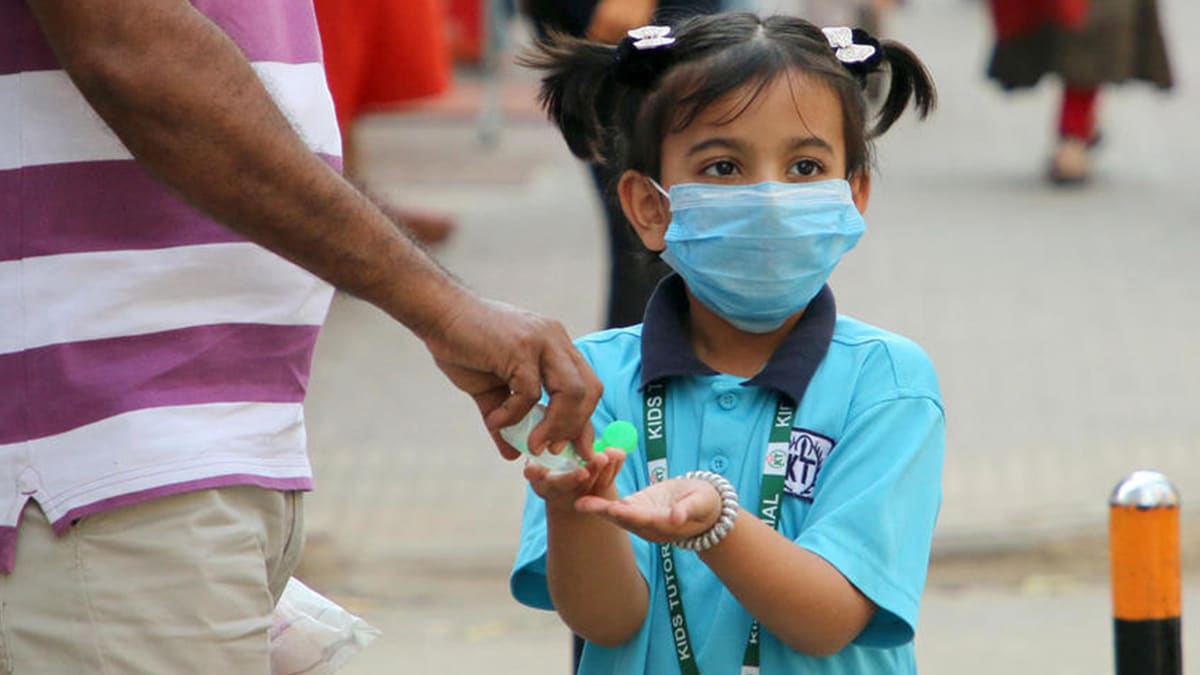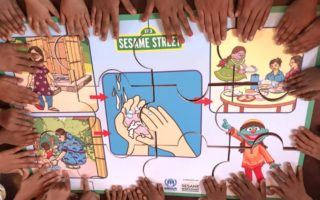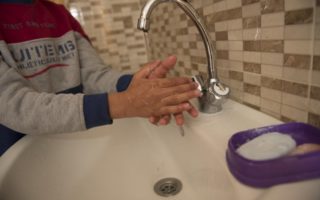
A young girl wears a protective mask as a preventive measure against the spread of COVID-19 in Dhaka. © Ritzau Scanpix
On January 30, 2020, the World Health Organization (WHO) declared the novel coronavirus (COVID-19) outbreak a public health emergency of international concern. On March 11, 2020, the WHO officially declared the COVID-19 outbreak a pandemic.
The coronavirus situation is dynamic and more information on the virus and its behavior is emerging all the time. The outbreak is a global challenge that must be addressed through international solidarity and cooperation.
UNHCR, the UN Refugee Agency, has been closely following the situation as well as the guidance on COVID-19 issued by WHO, alongside our fellow UN agencies and other partner organizations. As per our mandate, we have been monitoring its possible effects on refugees and forcibly displaced populations.
Impact on Refugees
COVID-19 does not discriminate. Refugees are at the same risk of contracting and transmitting the virus as local populations. As such, UNHCR cautions against measures specifically directed at refugees and which are not scientifically sound or do not conform to recommended public health practice and guidance of WHO.
Over 80 per cent of the global refugee population and nearly all of world’s internally displaced people are hosted in low to middle-income countries, which have weaker health and water and sanitation systems, and often find themselves in overcrowded places. International support is urgently needed to help the countries hosting refugees and displaced people step up services both for them and for local communities.
We are all concerned about our health and well-being. But this crisis is a reminder that in order to effectively combat any public health emergency, everyone – including refugees and internally displaced people – should be able to access health facilities and services in a non-discriminatory manner.
What UNHCR Is Doing
UNHCR is doing its part to prevent and respond to the COVID-19 outbreak, building on our experience in the previous outbreaks of Severe Acute Respiratory Syndrome (SARS) and influenza, to which the novel coronavirus is related, as well as Ebola. UNHCR’s preparedness measures protect refugees and other people of concern to UNHCR before, during and after global health emergencies.
UNHCR’s activities are conducted under the overall lead of the health authorities in the respective refugee host countries and WHO, and in close coordination with all partners involved. Our primary goal is to ensure that all measures taken are aligned with the rights and needs of refugees and host communities, and that refugees and other persons of concern are included in the national COVID-19 surveillance, preparedness and response planning and activities.
In response to current data, UNHCR has followed WHO’s guidance and identified a number of prevention and response activities in refugee situations. UNHCR may choose to supplement national responses to cater for needs in areas hosting refugees and other persons of concern that may not be adequately covered. Such country-specific support aims at:
- Infection prevention and control: Ensuring adequate access to clean Water, Sanitation and Hygiene (WASH) supplies such as soap, narrow necked water containers, and covered buckets for households, and waste disposal in refugee communities, including health facilities, collective shelters and reception centres.
- Risk communication and community engagement: Strengthening communications with refugee and displaced communities with information on hygiene measures, using available national and community education programmes and adapting communication materials to suit local linguistic and cultural needs.
- Epidemiological surveillance, rapid response teams and case investigation: Contributing to surveillance, active case finding, contact tracing and investigation of alerts in collaboration with Ministries of Health, WHO and partners, including at points of entry and refugee sites.
- Case management: Training health workers in refugee sites on case definitions and disease identification and management, home care for mild cases, identification of secondary referral facilities in lien with guidelines by Ministries of Health and WHO.
- Protection monitoring: Putting in place mechanisms in collaboration with governments and partners to monitor and report as well as mitigate potential protection risks for refugees and displaced people, including restriction to access to territory and right to seek asylum.
- Country-level coordination, planning and monitoring: Advocating for the inclusion of refugees and displaced people in national contingency planning efforts, including calculation of needs in stockpiles of medical and WASH supplies, contributing to UN Country Team and other coordination meetings, reviewing health partner capacity to respond in the event of an outbreak in refugee camps and settlements.
UNHCR is grateful for the ongoing support and generosity of donors across Canada who make the organization’s work possible. Flexible funding at global level is key to allow timely emergency response to the evolving needs wherever required.
Updates from UNHCR on COVID-19
- March 27, 2020: Q&A: Access to health services is key to halting COVID-19 and saving refugee lives
- March 25, 2020: UNHCR seeks US$255 Million to Respond to COVID-19 Outbreak
- March 25, 2020: Live Blog: Refugees in the COVID-19 Crisis
- March 19, 2020: Statement by Filippo Grandi, UN High Commissioner for Refugees on the COVID-19 crisis
- March 17, 2020: IOM, UNHCR announce temporary suspension of resettlement travel for refugees
- March 15, 2020: UNHCR’s airlift with vital medical aid lands in Iran
- March 12, 2020: The coronavirus outbreak is a test of our systems, values and humanity
What UNHCR is doing in Canada
For the safety and well-being of our communities, the UNHCR Canada team will be transitioning towards working remotely over the next few weeks. However, as always, our priority and commitment remains that of supporting refugees and forcibly displaced populations.
Additional information on COVID-19:
- For UNHCR Canada donor and fundraising inquiries, please contact donorcare@unhcr.ca
- For UNHCR Canada media inquiries, please contact Melanie Gallant, Head of Communications & External Relations, UNHCR Canada Email: gallant@unhcr.org Tel.: +1 613-850-1268
- For all other inquiries, please contact our branch office in Ottawa at canot@unhcr.org




